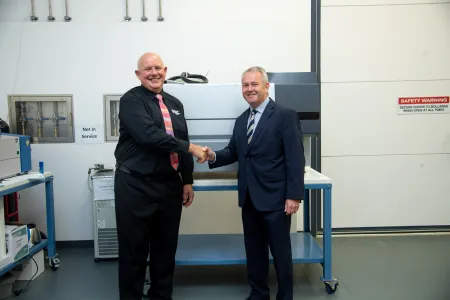News
CDU receives research and development equipment from Ichthys LNG
The INPEX-led Ichthys joint venture has made a significant investment into research and development in the Northern Territory, gifting Charles Darwin University (CDU) a key piece of equipment critical for detecting traces of metals and chemical elements in groundwater, wastewater, soil, and solid waste samples.
CDU recently took delivery of the inductively coupled plasma optical emission spectroscopy or ICP-OES which will play a key role in several research projects at CDU as well as helping with teaching.
CDU Vice-Chancellor Professor Scott Bowman said he is thrilled to continue the long-standing partnership CDU has with INPEX.
“We are very thankful to INPEX and the Ichthys joint venture for their generous donation which will play a big part in enhancing our research and teaching capability in the Northern Territory,” Professor Bowman said.
“INPEX is a wonderful industry partner of ours and throughout the years our graduates have gone on to work with them. We look forward to collaborating with them more to continue our vision of being Australia’s most connected University.”
The ICP-OES identifies the chemical composition of a particular sample and detects the amount of each element in a particular sample. It can perform complex multi-elemental quantitative analysis in one run.
CDU PhD students Caleb Oluwaseun Ojo, Angel Aguilar Morones and Azeb Bekele are all working on projects that focus on pollutants formed in the chemical recycling of plastics containing brominated flame retardants (BFRs).
BFRs are synthetic chemicals added to a wide variety of products including building insulation, plastics, and appliances to help make them less flammable. BFRs have the potential to impact the environment and human health.
Maria Ali is investigating per and polyfluoroalkyl substances (PFAS) which is an organic contaminant present in water while Hansi Alwis is looking into the synthesis of silver nanoparticles with Terminalia ferdinandiana leaf and fruit extracts to examine the possibility of increasing the efficacy of potential medicinal properties.
The ICP-OES will be used to analyse the many samples produced as part of these research projects.
CDU Faculty of Science and Technology Associate Dean of Research and Senior Lecturer in Chemistry Dr Vinuthaa Murthy said the ICP-OES will be incredibly beneficial to students.
“Currently, some of the analysis required for these projects is being done externally, but now we can do this analysis here which will help to accelerate our students’ research outputs,” Dr Murthy said.
“We will also be able to use the ICP-OES to help teach environmental chemistry to students as this equipment is vital in assisting with water quality monitoring as the number of pollutants in the water can be accurately measured.”
In addition to the ICP-OES, the INPEX-led Ichthys joint venture also gifted other equipment, including a microscope, a moisture analyser, a temperature-controlled bath, a densitometer, a colour analyser, an incubator, a TOC analyser, and heating blocks.
INPEX Senior Vice President Corporate, Bill Townsend said this donation was a fantastic way to make a difference in the Northern Territory.
“The laboratory equipment was required for the initial start-up phase of Ichthys LNG’s onshore facility in the Northern Territory, around five years ago. We saw value in donating the equipment to support CDU’s important research and development programs,” Mr Townsend said.
“INPEX and the Ichthys joint venture are proud to engage with the University and support positive research and training outcomes in the Northern Territory and beyond.”
“We have a long-term relationship with CDU, and it is important to us to help encourage Territorians to stay in the Territory for their education and to have pathways into the energy industry, hopefully this equipment will help with that,” he said.
Related Articles

First “hype cycle” of AI development put tech above humans
Users around the world have rushed to adopt artificial intelligence - especially in safety-critical fields - but a new study has revealed the hype has prioritised technology for technology’s sake instead of human-centred development.
Read more about First “hype cycle” of AI development put tech above humans
Nanoplastics hindering cognitive abilities of fish, international research shows
Nanoplastic exposure can impair the cognitive abilities of fish and could lead to significant impacts on marine species’ ability to survive, according to a new international study.
Read more about Nanoplastics hindering cognitive abilities of fish, international research shows
New project to grow Indigenous aquaculture on one of Australia’s largest islands
An Australian island’s efforts to improve food security and transition into a blue economy will be bolstered by a new project to propagate a nutritious and increasingly popular fish.
Read more about New project to grow Indigenous aquaculture on one of Australia’s largest islands
